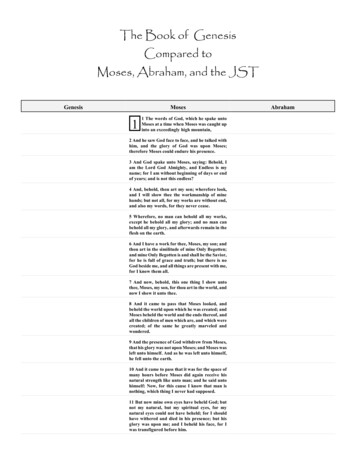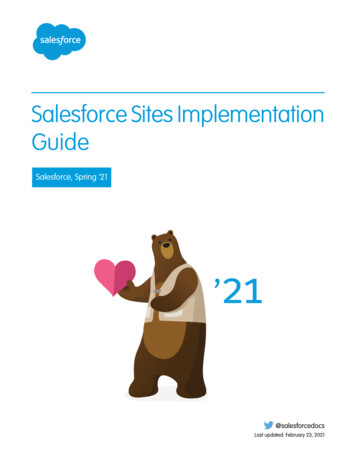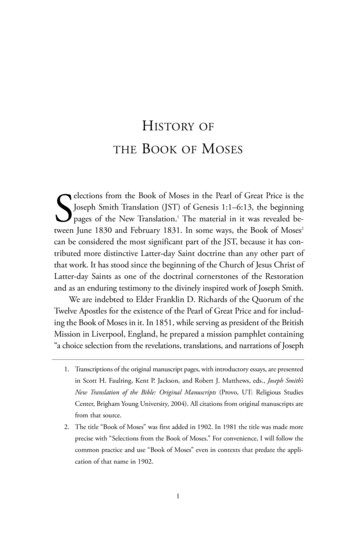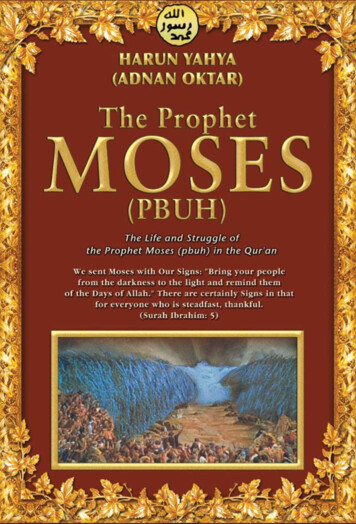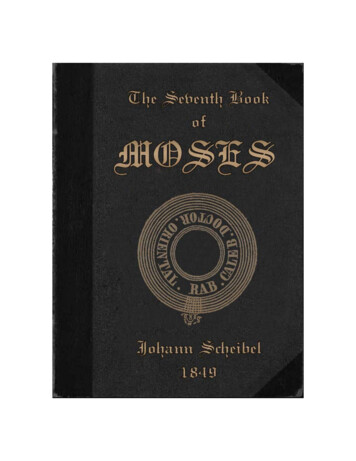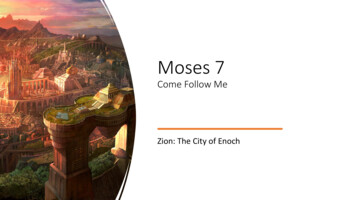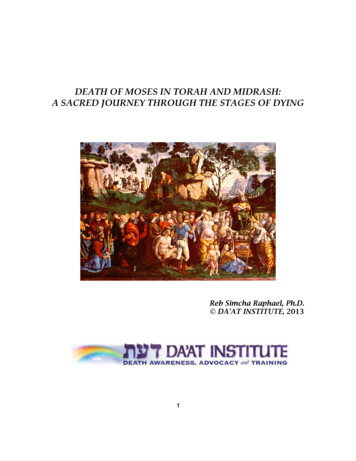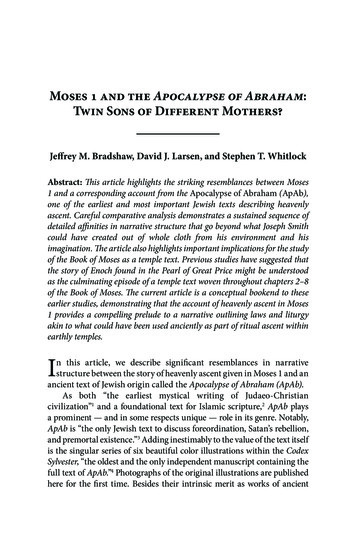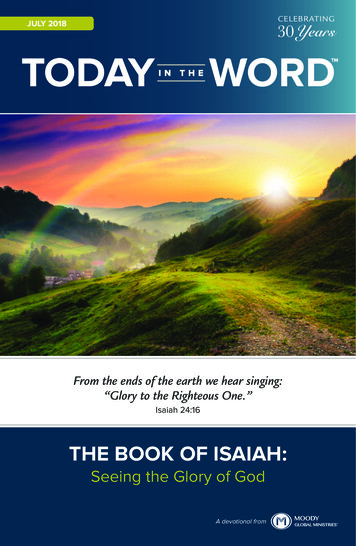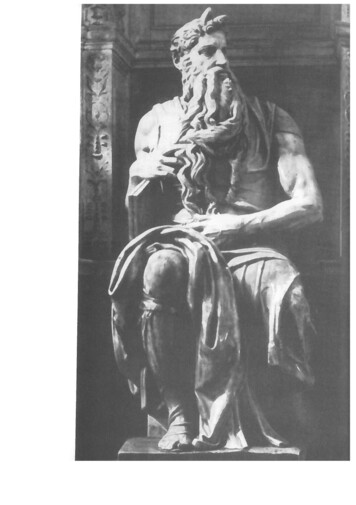
Transcription
MOSES:THE SERVANTOF YAHWEH?C. 1280 B.C.C. 1240 B.C.BornLed Exodus of the Jewish peoplefrom EgyptDiedThe history of the ancient Hebrews crisscrossed the histories of theother peoples of the ancient Near last throughout antiquity. Thepatriarch Abraham came from the Sumerian city of Ur. The “promised land” to which he went was that of the Canaanites, a peopleclearly documented in the nonbiblical sources of the second millennium B.C. Abraham and his people contended with such historicalnations as the Amorites, the Hittites, the Assyrians, and the Philistines. Jacob served Laban “the Aramean” and married his daughtersLeah and Rachel. Joseph was sold into slavery in Egypt by his jealousbrothers but found favor with the pharaoh, who proclaimed, “Behold, I have set you over all the land of Egypt.”Yet in none of the records of these other historical peoples is thereany reference to the ancient Hebrews, to any of their leaders’ names,or to any of the events so graphically depicted in the opening books ofthe Old Testament—not a single contemporary document, not a stelenor a carving, not even a scribbled reference on a dusty shard. Thereis no Egyptian record of a pharaoh who raised Joseph up nor of asuccessor “which knew not Joseph,” neither a reference to any Egyptian vizier or court figure whose name might possibly have beenJoseph nor a single Egyptian reference to the Hebrew tribes descended from Joseph’s brothers, who came at his behest to dwelt inthe land of Goshen.But despite the maddening silence of the nonbiblical sources, thebiblical history of the early Hebrews remains a history. It moves3
4A’Ioses. The Servant of Yahwehthrough time, generation after generation; events have the ring ofauthenticity about them, the “thickness” and stubborn uniqueness ofgenuine historical events; and the characters, both major and minor,have the solid individuality of historical personalities. The history ofthese people and events is, in the phrase of Martin Buber, a “sagahistory,” a history that is partially visible and susceptible to modernhistorical analysis, but partially hidden in what Abram Leon Sacharcalls “the grey morning of folk-memory and fable.”2This is the case not only with the patriarchs but also with the greathero figure who stands between the patriarchs and historical Israel:Moses, the founder of the Hebrew nation. The events surroundingthe figure and the accomplishments of Moses are the watershed ofHebrew history, of the religion of Judaism, and of the JudaeoChristian tradition. To quote Martin Buber again, “The meeting of apeople with events so enormous that it cannot ascribe them to its ownplans and their realisation, but must perceive in them deeds performed by heavenly powers, is of the genuine substance of history.”3‘Martin Buber, Moses, the Revelation and the Covenant (New York: Harper, 1958),pp.15—19.2Abram Leon Sachar, A History of the Jews, 5th. ed. rev, and enlarged (New York:Knopf, 1968), p. 9.3Buber, Moses, p. 16.
FThe Moses of Exodusiinor,)ryof“saga)dernacharreatael1df aeoof aownper)ry.York:—The only sourcefor the story of Moses and the enormous events surrounding him isthe Old Testament book of Exodus. for Moses, like the patriarchs before him, is notmentioned in any nonbiblical source or record. The account in Exodus begins withthat nameless Egyptian pharaoh “which knew not Joseph,” and witit a drasticchange in the fortunes of those Hebrews who Itad come to Egypt at Joseph’sinvitation, No longer did they enjoy “thefat of the land.” This pharaoh was fearfulof their numbers and enslaved them to build “store cities” for him, Pithom andRamses. But the Hebrews increased even in affliction until the pharaoh decreedthat every male Hebrew baby be cast into the Nile; daughters were to be spared. Itwas at this crucial juncture of events that Moses was born, to parents both of whomwere of the house of Levi. After three months, witen she could hide him no longer,his mother laid the infant in a basket of butrushes daubed with bitumen and pitch,and placed it in the reeds at the rivers edge. Here the baby was discovered by thepharaohs daughter, taken by her, given the name Moses, and raised in herhousehold as her own son.One day, when Moses had grown up, he went out to his people andlooked on their burdens; and he saw an Egyptian beating a Hebrew,one of his people. He looked this way and that, and seeing no one hekilled the Egyptian and hid him in the sand. When he went out thenext day, behold, two Hebrews were struggling together; and he saidto the man that did the wrong, “Why do you strike your fellow?” Heanswered, “Who made you a prince and a judge over us? Do youmean to kill me as you killed the Egyptian?” Then Moses was afraid,and thought, “Surely the thing is known.” When Pharaoh heard of it,he sought to kill Moses.But Moses fled from Pharaoh, and stayed in the land of Mid’ian;and he sat down by a well. Now the priest of Mid’ian had sevendaughters; and they came and drew water, and filled the troughs towater their father’s flock. The shepherds came and drove themaway; but Moses stood up and helped them, and watered their flock.When they came to their father Reu’el, he said, “How is it that youhave come so soon today?” They said, “An Egyptian delivered us outof the hand of the shepherds, and even drew water for us andwatered the flock.” He said to his daughters, “And where is he? Whyhave you left the man? Call him, that he may eat bread.” And Moseswas content to dwell with the man, and he gave Moses his daughterZippo’rah.Now Moses was keeping the flock of his father-in-law, Jethro, thepriest of Mid’ian; and he led his flock to the west side of the wilder5
6Moses: The Servant of Yahwehness, and came to Horeb, the mountain of God. And the angel of theLord appeared to him in a flame of fire out of the midst of a bush;and he looked, and lo, the bush was burning, yet it was not consumed.And Moses said, “I will turn aside and see this great sight, why thebush is not burnt.” When the Lord saw that he turned aside to see,God called to him out of the bush, “Moses, Moses!” And he said,“Here am I.” Then he said, “Do not come near; put off your shoesfrom your feet, for the place on which you are standing is holyground.” And he said, “I am the God of your father, the God ofAbraham, the God of Isaac, and the God ofJacob.” And Moses hid hisface, for he was afraid to look at God.Then the Lord said, “I have seen the affliction of my people whoare in Egypt, and have heard their cry because of their taskmasters;I know their sufferings and I have come down to deliver them out ofthe hand of the Egyptians, and to bring them up out of that land toa good and broad land, a land flowing with milk and honey, to theplace of the Canaanites, the Hittites, the Amorites, the Per’izzites,the Hivites, and the Jeb’usites. And now, behold, the cry of thepeople of Israel has come to me, and I have seen the oppressionwith which the Egyptians oppress them. Come, I will send you toPharaoh that you may bring forth my people, the sons of Israel, outof Egypt.”At first A1oses was reluctant to accept God’s mission: he was neither worthy noreloquent enough. But God convinced him by miracles, by the promise of his owndivine support, and commanded Moses’ brother Aaron to go with him. So Mosesand hisfamily and his brother Aaron returned to Egypt and to yet another pharaohand put God’s command to him. But not onl’ did the pharaoh refuse to let theenslaved Hebrews go, he increased their misery: “Let heavier work be laid upon themen that they may labor at it and ay no regard to lying words” (5:9).Once more Moses and Aaron went to the pharaoh. Once niore the pharaohcontemptuously refused. And God brought upon the land a series of plagues,including a plague offrogs, one of gnats and flies, and a plague that felled theEgyptians’ flocks and herds but spared those of the Hebrews. Each time thepharaoh would promise to comply, only to recant and be set upon by yet anotherplague—hail and locusts and a “thick darkness.” At last God brought the mostterrible plague of all: “The Lord slew alt the firstborn in the land of Egypt,both the first-born of man and the first-born of cattle” (13:15). Again thechildren of Israel were spared, and the ceremony of Passover thereupon established, for the vengeful Lord “passed over” their houses with the doorpostsmarked with the blood of sacrificial lambs. Among the Egyptian dead was thepharaoh’s own first-born son. He was at last read’ to let the Israelites go. Hesummoned Moses and Aaron and said, “Rise up, go forth from among mypeople, both you and the people of Israel” (12:31).
IThe Moses of Exodusof thebush;imed.‘y theo see,said,shoesholyid his whoSters;ut offid tothezites,the;sionu ststheHe7When Pharaoh let the people go, God did not lead them by way of theland of the Philistines,4 although that was near; for God said, “Lest thepeople repent when they see war, and return to Egypt.” But God ledthe people round by the way of the wilderness toward the Red Sea.And the Lord went before them by day in a pillar of cloud to leadthem along the way, and by night in a pillar of fire to give themlight, that they might travel by day and by night; the pillar of cloudby day and the pillar of fire by night did not depart from before thepeople.Then Moses stretched out his hand over the sea; and the Lorddrove the sea back by a strong east wind all night, and made the seadry land, and the waters were divided. And the people of Israel wentinto the midst of the sea on dry ground, the waters being a wall tothem on their right hand and on their left. The Egyptians pursued,and went in after them into the midst of the sea, all Pharaoh’s horses,his chariots, and his horsemen. And in the morning watch the Lord inthe pillar of fire and of cloud looked down upon the host of theEgyptians, and discomfited the host of the Egyptians, clogging theirchariot wheels so that they drove heavily; and the Egyptians said, “Letus flee from before Israel, for the Lord fights for them against theEgyptians.”Then the Lord said to Moses, “Stretch out your hand over thesea, that the water may come back upon the Egyptians, upon theirchariots, and upon their horsemen.” So Moses stretched forth hishand over the sea, and the sea returned to its wonted flow when themorning appeared; and the Egyptians fled into it, and the Lordrouted the Egyptians in the midst of the sea. The waters returnedand covered the chariots and the horsemen and all the host ofPharaoh that had followed them into the sea; not so much as one ofthem remained. But the people of Israel walked on dry groundthrough the sea, the waters being a wall to them on their right handand on their left.Thus the Lord saved Israel that day from the hand of the Egyptians; and Israel saw the Egyptians dead upon the seashore. AndIsrael saw the great work which the Lord did against the Egyptians,and the people feared the Lord; and they believed in the Lord and inhis servant Moses.Once across the Red Sea and in the wilderness of Sinai, the people suffered hungerand thirst. In spite of Gods gifts of manna from heaven, offlights of quait and4The land of the Philistines was in Canaan, along the eastern Mediterranean fromEgypt to Ekron. [All notes are the editor’s unless identified otherwise.]
8Moses: The Servant of Yahwehbitter springs that he changed to sweet water, the people “murmured againstMoses” and against God. T/ie’y had to fight against the Amatekites, and Mosesstruggled to develop among them a sense of nationhood and a government.On the third new moon after the people of Israel had goneforth outof the land of Egypt, on that day they came into the wilderness ofSinai. and there Israel encamped before the mountain.And Moseswent up to God, and the Lord called to him out of the mountain,saying, “Thus you shall say to the house of Jacob, and tellthe peopleof Israel: You have seen what I did to the Egyptians, and howI boreyou on eagles’ wings and brought you to myself. Now therefore, ifyou will obey my voice and keep my covenant, you shallbe my ownpossession among all peoples; for all the earth is mine, andyou shallbe to me a kingdom of priests and a holy nation. These arethe wordswhich you shall speak to the children of Israel.”So Moses came and called the elders of the people, andset beforethem all these words which the Lord had commandedhim. And allthe people answered together and said, “All that theLord has spokenwe will do.” And Moses reported the words of the peopleto the Lord.And the Lord said to Moses, “Lo, I am coming to you ina thick cloud,that the people may hear when I speak to you, and mayalso believeyou for ever.”On the morning of the third day there were thundersand lightflings, and a thick cLoud upon the mountain, and a veryloud trumpetblast, so that all the people who were in the camptrembled. ThenMoses brought the peopLe out of the camp to meetGod; and theytook their stand at the foot of the mountain. AndMount Sinai waswrapped in smoke, because the Lord descended uponit in fire; andthe smoke of it went up like the smoke of a kiln,and the wholemountain quaked greatly. And as the sound of thetrumpet grewlouder and louder, Moses spoke, and God answeredhim in thunder.And the Lord came down upon Mount Sinai, to thetop of the mountain; and the Lord called Moses to the top of themountain, andMoses went up.And God spoke all these words, saying,“I am the Lord your God, who brought you outof the land ofEgypt, out of the house of bondage.“You shall have no other gods before me.“You shall not make for yourself a graven image,or any likeness of anything that is in heaven above, orthat is in the earthbeneath, or that is in the water under the earth;you shall not bowdown to them or serve them; for I the Lord yourGod am a jealousGod, visiting the iniquity of the fathers upon thechildren to thethird and the fourth generation of those who hateme, but showing
Renan I Moses between Myth and HistoryigainsiMoses:h outess ofvlosesritain,eopleborere, ifownshallvordseforeid e.9steadfast love to thousands of those who love me and keep mycommandments.“You shall not take the name of the Lord your God in vain; for theLord will not hold him guiltless who takes his name in vain.“Remember the sabbath day, to keep it holy. Six days you shalllabor, and do all your work; but the seventh day is a sabbath to theLord your God; in it you shall not do any work, you, or your son, oryour daughter, your manservant, or your maidservant, or your cattle, or the sojourner who is within your gates; for in six days theLord made heaven and earth, the sea, and all that is in them, andrested the seventh day; therefore the Lord blessed the sabbath dayand hallowed it.“Honor your father and your mother, that your days may be longin the land which the Lord your God gives you.“You shall not kill.“You shall not commit adultery.“You shall not steal.“You shall not bear false witness against your neighbor.“You shall not covet your neighbor’s house; you shall not covetyour neighbor’s wife, or his manservant, or his maidservant, or his ox,or his ass, or anything that is your neighbor’s.”Now when all the people perceived the thunderings and the lightflings and the sound of the trumpet and the mountain smoking, thepeople were afraid and trembled; and they stood afar off, and said toMoses, “You speak to us, and we will hear; but let not God speak to us,lest we die.” And Moses said to the people, “Do not fear; for God hascome to prove you, and that the fear of him may be before your eyes,that you may not sin.”Moses between Myth and HistoiyERNEST RENANI ofiketrth)OWousthetngThrough the long historical devetopment ofJudaism and of Christian history, themain tine of those traditions tended to accept without serious question the absolutetruth of the biblical narrative and raised no questions about the historicity ofbibticat people and events. It was only in the age of the Entightenment that suchquestions began to be raised. in the late seventeenth century, Spinoza had castdoubt on the Mosaic authorship of the Pentateuch, the first five books of the OldTestament, and advocated a rational and historical interpretation of the Bible. Inthe course of the late eighteenth century and especially the nineteenth, the notion ofthe historical interpretation of the Bible became commonly accepted, prompted in
10Moses. The Servant of Yahwehpart by the nineteenth-century enthusiasm for the new ‘scientfic” historiographyand in part by the popularity of Near Eastern archaeology. But even as thesetrends developed, religious fundamentalism had reached an almost frantic pitch;and one of its cardinal principles was biblical literalism. At the center of theresulting whirlwind of controversy stood the French historian Ernest Renan(1823—1892).As a young man, Renan had trainedfor the priesthood, but he left his trainingand the Catholic church in 1845 over the question of the incompatibility of thechurch s teaching with modern historical criticism. Renan c dedication to historicalcriticism, in particular as it applied to the history of religion, datedfrom this time.He went on to become a distinguished Semitic scholar and professor of HebrewStudies at the College de France and eventually a member of the French Academy.He also became one of the most controversial public figures of his time. In 1863 hewrote his mostfamous book, a massive Life ofJesus. It was a thoroughgoing pieceof rational skepticism in which he interpreted Jesus as “an incomparable man,” buta man nevertheless. The book and the author were vilified by orthodox critics bothCatholic and Protestant, and both the book and Renan became celebrated, evennotorious.In the next twenty years, Renan returned to his Semitic studies and began workon his most important book, a five-volume History of the People of Israel.Bythis time he had somewhat tempered the sharp-edged rationalism that had characterized his Life ofJesus. He saw instead the process of Hebrew history evolving asa demonstration of the human capacity for faith. He was, in short, a scholaryearning to believe, to find a way for the historian to accept the myth andfolklorethat stood as so much of the history of the ancient Hebrews. One of his critics hascharacterized his History of the People of Israel as “providing less a historythan a half imaginative reconstruction of society and religion before the historicalperiod. Renan himself wrote in the preface of the book, “We do not need to know,in histories of this kind, how things happened; it is sufficient for us to know howthey might have happened” p. xvii).We turn now to his account in History of the People of Israel of Moses andhis age.“Moses is completely buried by the legends which have grown up overhim, and though he very probably existed, it is impossible to speak ofhim as we do of other deified or transformed men. His name appearsto be Egyptian. Mosé is probably the name of Ahmos, Amosis, shortened at the beginning. According to the prevalent tradition, Moseswas a Levi, andthis name probably was used to designate theEgyptians whose services were required for the worship and whofollowed Israel into the desert. The name of Aharon, perhaps, isderived in a similar way. Moses appears to us at first as having been.5G. P. Gooch, History and Historians in the Nineteenth Centuiy (London: Longmans,1928), p. 528.
Renan / Moses between Myth and Historygraphythesepitch;of theRenan aznzngof thetoricalts lime,e rew63ihjecet”butcs bothevenworktel. ByIzarac‘ingaschotartktorecs hassto’oricatknow,v howrjs andoverak ofJearshortlosesthewhobrought up by, and being a functionary of, the Egyptians. The fact ofhis killing an Egyptian in a moment of instinctive indignation hasnothing improbable about it. His relations with the Arab Midianites, aspecies of Hebrews not reduced to servitude by Egypt, and with theIdumean Kenites, especially with a certain leter or Jethro, whosedaughter he is said to have married, also seem to have a semihistorical character. With regard to whether he was really the leaderof the revolt and the guide of fugitive Israel, it is unquestionably quitepossible that an Egyptian functionary of mixed race, told to keepwatch over his brethren, may havebeen the author of the deliverance. But it is also possible that all these narratives of the Exodus, intowhich fable has penetrated so deeply, may be even more mythicalthan is generally supposed, and that the only fact which can be depended upon out of them all is the departure from Egypt of Israeland its entry into the peninsula of Sinai.It does not seem as if the Israelites and their companions had anyother object in view, before they left Pa-Rameses, except to escape thetyranny of Pharaoh.Having escaped from what they always called “the house of bondage,” the people of Israel found themselves face to face with what isperhaps the most inhospitable desert under heaven.The narratives of the incidents which occurred during this march,which afterwards became the basis of a religion, or, to speak morecorrectly, of universal religion, all of them attribute the principal partto Mosé. I have already pointed out that this theory can only beaccepted with considerable reserve, but it is probable, nevertheless,that the activity of the semi-Egyptian Hebrew, who seems to have hadmuch to do with the preparations for the exodus, was again manifested during the marches through the desert. Another Levite, namedAhron, or Aharon (an Egyptian name, perhaps), stands out side byside with him, as well as a woman named Miriam, who, according tothe legend, were his brother and sister. Some narratives attachedmore importance to these persons than do the versions which havecome down to us.There is perhaps some foundation for what we are told as to therelations which Moses established with the tribes to the east ofEgypt, and these relations would have been useful to him in thedifficult task which he had assumed. But one hesitates about speaking of the shadows dimly outlined in the darkness of profound nightas real personages.The voyage of Israel through the desert was a passage, not asojourn; but the impression which this short period of miserableexistence left upon the minds of the people was very deep. Alt thecircumstances, of which a more or less distorted recollection waspreserved, were regarded as sacramental, and the theocratic casteafterwards moulded them to the purposes of its religious policy. The.)S, 15beenmans,11
Moses: The Servant of Yahweh12slightest incidents were magnified, and the manna and the quailswere adduced as proofs that the people had been miraculously fed,and that God himself had been their guide, and had marched beforethem in the way. Upon these vast solitary plains, where the atmosphere is so luminous, the presence of a tribe can be detected fromafar by the smoke which ascends straight up towards the sky. Nighttime is often chosen for a march, and in that case a lighted lantern,fastened on to the end of a long pole, is often used as a rallying sign.This column, invisible by day, luminous by night, was the very Godof Israel, guiding his people through these solitudes. This goodgenius of the desert had shown such a special affection for Israelthat the people came to invoke him in a quite personal way. TheGod who had brotight Israel out of Egypt and enabled them to livein “the land of thirst” was not the absolute Elohim, the great God,King, and Providence of the whole universe. He was a god who hada special affection for Israel, who had bought them as merchandise.How far we are here from the ancient patriarchal God, just anduniversal!6 The new god of whom I am speaking is in the highestdegree partial. His providence has only one aim, and that is to watchover Israel. He is not as yet the god of a nation, for a nation is theproduce of the marriage of a group of men with some land, andIsrael has no land; but he is the god of a tribe in every sense of theword.A protecting god needs a proper name, for the protecting god is aperson; he becomes identified with those whom he protects.By a process of ideas which it is impossible now to follow out, theprotecting god of Israel was called Iahveh. Each step towards theformation of the national idea was, it will be seen, accompanied by adegradation in the theology of Israel. The national idea was infavour of a god who would think only of the nation, who in theinterests of the nation would be cruel, unjust, and hostile to thewhole human race. Iahvéism commenced, to all intents and purposes, the day that Israel became egotistical as a nation principle;and it grew with the nation, becoming an obliteration of the sublimeand true idea of the primitive Elohism. Fortunately there was in thegenius of Israel something superior to national prejudices. The oldElohism was never to die; it was to survive Iahvéism, or rather toassimilate it.The people clamoured for Mnévis and Hathor. It is doubtfulwhether Mosé was so much opposed to this idolatrous worship as wasafterwards asserted, for we find that a brazen serpent said to have.6Renan is here making a distinction that other scholars make too between Yahweh,the God of Moses, and El or Elohim, the earlier God of the patriarchs.
Renan / Moses between M’vth and HistoryquailsJy fed,beforeatmo1 fromNight.ntern,g sign.y GodgoodIsraeli. Theto liveGod,o hadndise.t andighestwatchis theand)f thed is athes the[by aas ini the) thepur:iple;)limei theoldr tot,btfulwashave13been set up by him was in existence until the reign of Hezekiah, whobroke it in pieces.At a later date it was asserted that Moses had lifted up andplaced upon a pole, as a talisman against the bite of the serpents,this mysterious Nehustan. Both versions may be true, for it is not atall impossible that Moses may have been, in some ways, one ofthose sorcerers whom Egypt possessed, or who came from thebanks of the Euphrates. No alterations are too great to have takenplace after the lapse of five or six centuries, when a religious genius as powerful as that of the Hebrews is working upon an oraltradition which is above all things non-resistant and susceptible ofany degree of transformation.Koreb, or Sinai, from the most remote antiquity, was the object ofreligious worship on the part of the people of Hebrew or of Araborigin who roamed about those parts. They made pilgrimages there.The Semites of Egypt went there frequently to offer up sacrifices.They believed that their god resided there. The holy mountainspread terror a long way around it. It was called par excellence “themountain of Elohim,” or “the mountain of God.” It was admitted thatthe Elohim resided on its summits, snowy or shining, limpid as crystalor gloomy and enveloped with a terrible covering of mist.Sinai was therefore above all a mountain of terror. Certain spotswere considered holy, and one could not walk on them without takingoff one’s shoes. The general belief was that one could not see the godand live. Even his presence killed. The common people could notapproach him.Even those who enjoyed the honour of conversing with him face toface expiated that honour by death. It was related that one day, inHoreb, Moses wished to see the glory of this terrible god. The godtook him, placed him in the cleft of a rock, made him stand up,covered him with his large open hand, and passed by. Then he withdrew his hand so that Moses saw his back parts. Had Moses seen hisface he would have died.The god of Sinai, it will be seen, was a god of lightning. Histheophanies took place in the storm, in the midst of the flashing oflightning. The ancient Iahveh had already perhaps possessed some ofthese characteristics. Iahveh besides was decidedly beginning to playthe part of the tutelary god of Israel, and was replacing the old etohim inthe imagination of the people. It was therefore only natural that theyshould identify Iahveh with the god through whose lands they werepassing and whose terrible influence they thought that they felt.What really happened when, from the camp of Rephidim, the tribeentered the rocky defiles of the Horeb? Impossible to say.Two things only can be perceived. The first is that from the commencement of the Sinaitic epoch it became the custom to regard.iweh,.
14Moses: The Servant of YahweltIahveh as appearing in the form of a vision of flame. for clothing hehad a thick cloud, for voice the thunder. In the storm he rode uponthe wind and made the clouds his chariot.A second well-ascertained fact, not less remarkable, is that thelahveh of the Hebrews, when definitely constituted, lived in Sinai, asJupiter and the Grecian gods lived in Olympus. His dwelling was onthe mountain top, especially when the summit was hidden from sightby heavy clouds. From thence he burst forth with horrible sounds,lightning, flames of fire, and thunder. The fundamental image of theHebrew religion and poetry is the theophany of Iahveh appearing likean aurora borealis to judge the world.Sinai became therefore the Olympus of Israel, the place fromwhence all the luminous apparitions of Iahveh issued. It was onlynatural that when they desired a Thora from Iahveh they made himreveal it on Mount Sinai or Mount Horeb. At this remote epoch, thatis to say when Israel went up to the mountain of God, did the peoplethink that they heard some lesson? Did Moses take advantage of thecircumstance to inculcate certain precepts? The little influence exercised by those precepts in the daily life of Israel, during the six orseven hundred years which followed, favours the belief that theynever existed. It appears probable at least that the people left the holymountain filled with terror and persuaded that a powerful god inhabited its peaks. There were no doubt sacrifices offered and altarserected. There was, above all, a startling recollection. The people hadreally seen the god of the holy mountain.Mose
And Moses said, "I will turn aside and see this great sight, why the bush is not burnt." When the Lord saw that he turned aside to see, God called to him out of the bush, "Moses, Moses!" And he said, "Here am I." Then he said, "Do not come near; put off your shoes from your feet, for the place on which you are standing is holy .
